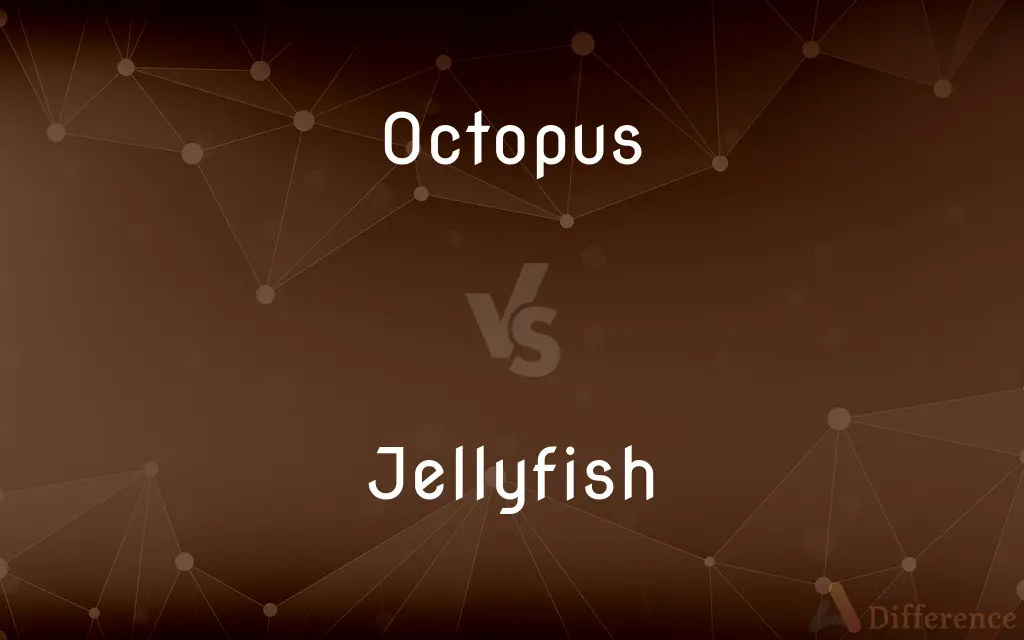Octopus vs. Jellyfish — What's the Difference?
Edited by Tayyaba Rehman — By Fiza Rafique — Updated on October 30, 2023
An octopus is a cephalopod with eight arms, a bulbous head, and no skeleton. A jellyfish is a gelatinous, umbrella-shaped marine animal with tentacles but no brain or heart.

Difference Between Octopus and Jellyfish
Table of Contents
ADVERTISEMENT
Key Differences
Octopus and Jellyfish are two intriguing marine creatures that captivate with their unique forms and behaviors. The octopus belongs to the cephalopod family, known for its intelligence and eight distinct arms. The jellyfish, on the other hand, is a more primitive creature, recognized for its gelatinous, often transparent body and long, stinging tentacles.
At a biological level, the octopus exhibits a greater complexity. It possesses a centralized nervous system, a beak, ink sac, and can exhibit a variety of behaviors, such as problem-solving or camouflaging. The jellyfish, conversely, lacks a brain and heart, instead having a simple nerve net that allows it to respond to its environment and a series of contractile cells that let it move.
The physical forms of an octopus and a jellyfish are distinctly contrasting. While the octopus is solid with a bulbous head and soft, boneless structure, the jellyfish takes on a translucent, often umbrella-shaped appearance. The octopus relies on its arms for movement, manipulating its environment, and capturing prey, while the jellyfish primarily drifts with ocean currents, occasionally contracting its bell-shaped body to move.
In terms of habitat, both octopuses and jellyfish are found in oceans worldwide. However, the octopus, being more adaptive, can be seen in various marine environments, from shallow waters to deep-sea trenches. Jellyfish typically inhabit near-surface waters, although some species can be found in deeper ocean layers.
Comparison Chart
Classification
Cephalopod
Cnidarian
ADVERTISEMENT
Physical Structure
Eight arms, bulbous head, soft body.
Gelatinous, umbrella-shaped, tentacles.
Nervous System
Centralized, with a brain.
Simple nerve net, no brain.
Movement
Uses arms and can change direction.
Drifts with currents, contracts to move.
Habitat Depth
Varies from shallow waters to deep-sea trenches.
Mostly near-surface, some in deeper waters.
Compare with Definitions
Octopus
An aquatic organism with a beak and an ink sac for defense.
The octopus squirted ink to elude the shark.
Jellyfish
A marine species that can sometimes cause painful stings to humans.
After being stung, she applied vinegar to the jellyfish mark.
Octopus
A marine creature with a soft body and eight arms.
The octopus cleverly escaped the fisherman's net.
Jellyfish
A simple sea creature, often transparent, drifting with currents.
Jellyfish are mesmerizing to watch as they float gracefully.
Octopus
A cephalopod known for its intelligence and adaptability.
Researchers are amazed by the problem-solving abilities of the octopus.
Jellyfish
An organism with no bones, brain, or heart, relying on a nerve net.
Despite having no brain, the jellyfish responded to external stimuli.
Octopus
A boneless sea animal that can change color for camouflage.
The octopus blended seamlessly with the coral.
Jellyfish
A gelatinous marine animal with tentacles that can sting.
I was careful not to touch the jellyfish while swimming.
Octopus
A creature with suction cups on its limbs to grasp objects.
The octopus grabbed the jar lid with its powerful arms.
Jellyfish
Jellyfish and sea jellies are the informal common names given to the medusa-phase of certain gelatinous members of the subphylum Medusozoa, a major part of the phylum Cnidaria. Jellyfish are mainly free-swimming marine animals with umbrella-shaped bells and trailing tentacles, although a few are anchored to the seabed by stalks rather than being mobile.
Octopus
Octopus (pl. octopuses, see below for variants) are soft-bodied, eight-limbed molluscs of the order Octopoda (, ok-TOP-ə-də).
Jellyfish
Any of numerous usually free-swimming marine cnidarians of the class Scyphozoa, characteristically having a gelatinous, tentacled, often bell-shaped medusa stage as the dominant phase of its life cycle. Also called true jellyfish.
Octopus
Any of various carnivorous marine cephalopod mollusks chiefly of the family Octopodidae, having a soft body, eight arms with suckers, a large distinct head, and a mouth with a strong beak.
Jellyfish
Any of various similar or related cnidarians.
Octopus
Something, such as a multinational corporation, that has many powerful, centrally controlled branches.
Jellyfish
(Informal) One who lacks force of character; a weakling.
Octopus
Any of several marine molluscs of the family Octopodidae, having no internal or external protective shell or bone (unlike the nautilus, squid and cuttlefish) and eight arms each covered with suckers.
Jellyfish
An almost transparent aquatic animal; any one of the acalephs, especially one of the larger species, having a jellylike appearance.
Octopus
(uncountable) The flesh of these marine molluscs eaten as food.
Jellyfish
A cnidarian, a member of the phylum Cnidaria.
Octopus
An organization that has many powerful branches controlled from the centre.
Jellyfish
A ctenophore, a member of the phylum Ctenophora (the comb jellies).
Octopus
To put (or attempt to put) one's fingers, hands or arms in many things or places at roughly the same time.
Jellyfish
A sudoku technique involving possible cell locations for a digit, or pair, or triple, in uniquely four rows and four columns only. This allows for the elimination of candidates around the grid.
Octopus
To spread out in long arms or legs in many directions.
Jellyfish
Any one of the acalephs, esp. one of the larger species, having a jellylike appearance. See Medusa and acaleph.
Octopus
To plug a large number of devices into a single electric outlet.
Jellyfish
Large siphonophore having a bladderlike float and stinging tentacles
Octopus
(by extension) To grow in use vastly beyond what was originally intended.
Jellyfish
Any of numerous usually marine and free-swimming coelenterates that constitute the sexually reproductive forms of hydrozoans and scyphozoans
Octopus
To hunt and catch octopuses.
Jellyfish
A cnidarian with a bell or umbrella-shaped body.
The jellyfish looked like a floating umbrella in the water.
Octopus
To behave like an octopus.
Octopus
A genus of eight-armed cephalopods, including numerous species, some of them of large size. See Devilfish.
Octopus
Any member of the genus Octopus.
Octopus
Something resembling an octopus in having numerous controlling arms or branches that reach widely and influence many activities; - used mostly of organizations, such as diversified corporations.
Octopus
Tentacles of octopus prepared as food
Octopus
Bottom-living cephalopod having a soft oval body with eight long tentacles
Common Curiosities
Are all jellyfish transparent?
No, while many jellyfish are transparent, some have colors and patterns.
Can a jellyfish sting be deadly?
While most jellyfish stings are painful, some species can deliver potentially deadly stings.
Is it true that octopuses can change color?
Yes, many octopuses can change color for camouflage or communication.
How many arms does an octopus have?
An octopus typically has eight arms.
How do octopuses defend themselves?
Octopuses use camouflage, ink squirting, and their beak as defense mechanisms.
Do octopuses have bones?
No, octopuses do not have bones; they have a soft body.
Do jellyfish have brains?
No, jellyfish do not have brains; they have a simple nerve net.
Do jellyfish live in groups?
Jellyfish can sometimes be found in groups called "smacks" or "swarms."
Can jellyfish swim against currents?
Jellyfish primarily drift with currents, but they can contract their bodies for limited movement.
Are octopuses considered intelligent?
Yes, octopuses are known for their problem-solving abilities and are considered highly intelligent among invertebrates.
How do octopuses reproduce?
Male octopuses transfer sperm to females using a specialized arm, and females lay eggs.
How do octopuses capture their prey?
Octopuses use their arms, suckers, and sometimes venom to capture prey.
What do jellyfish eat?
Jellyfish typically eat plankton, small fish, and other small marine organisms.
How long do jellyfish live?
Most jellyfish have a short lifespan, ranging from a few days to a year, depending on the species.
Can both octopuses and jellyfish be found in aquariums?
Yes, both octopuses and jellyfish are often displayed in aquariums for public viewing.
Share Your Discovery

Previous Comparison
Example vs. Sample
Next Comparison
Rain vs. ReignAuthor Spotlight
Written by
Fiza RafiqueFiza Rafique is a skilled content writer at AskDifference.com, where she meticulously refines and enhances written pieces. Drawing from her vast editorial expertise, Fiza ensures clarity, accuracy, and precision in every article. Passionate about language, she continually seeks to elevate the quality of content for readers worldwide.
Edited by
Tayyaba RehmanTayyaba Rehman is a distinguished writer, currently serving as a primary contributor to askdifference.com. As a researcher in semantics and etymology, Tayyaba's passion for the complexity of languages and their distinctions has found a perfect home on the platform. Tayyaba delves into the intricacies of language, distinguishing between commonly confused words and phrases, thereby providing clarity for readers worldwide.












































